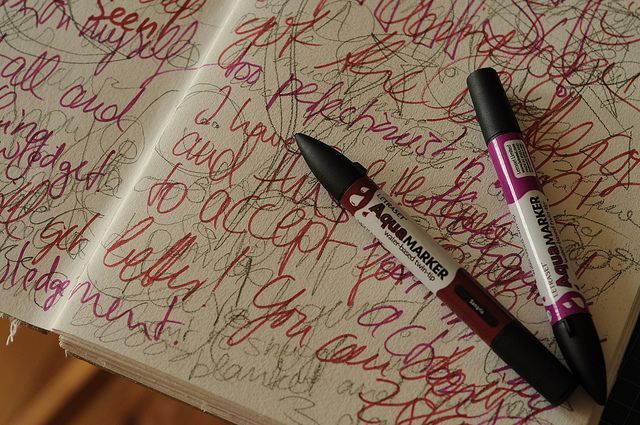
I kept a journal and dabbled in poetry ever since I was young, but it was never more essential than during the heartbreak of mourning my partner and my son.
Fortunately, I was a member of a women’s poetry group that wrote together weekly. Writing was not only cathartic as I poured my feelings out onto the page, it gave me an anchor. My son’s death three years after my partner, Michael’s, was an unexpected shock. My life shattered—writing rescued me. What I discovered is that when we write candidly through our grief, we are able to descend into emotional darkness in order to find secret blessings and bring them consciously into our lives.
Here are some of the ways that writing helped me to navigate through heartbreak.
1. Story as medicine: witnessing and sharing.
My poetry group decided to hold our first public reading during Día de los Muertos (Day of the Dead) to honor those we’d lost. I’d written a poem the day before Michael died that I wanted to share, but I felt too emotional to read it from a piece of paper. I needed the audience to embrace me and support me, so I memorized it. The connection was electrifying and gratifying. I had to give myself permission to share my grief honestly in public. I had to be authentic, to admit that I felt broken. Poetry gave me a way to transform my story into art. By sharing my art, I opened hearts, and mine was comforted by our solidarity. If you don’t write poetry, there may be other poems that you can share, perhaps at a meal or over the phone or attached to an email?
2. Practice until it becomes a habit.
Michael’s death was an initiation, but it did not prepare me for the shocking death of my son. It felt as though the rug was pulled out from under me. I could not pray or meditate or write. Eventually I re-joined my writing group. I figured that even though I could not write, I could show up and listen. These were my friends, this was my routine. However, once the pen was in my hand, it was natural to put it to paper. Like riding a bicycle, the practice of writing returned, because it was a habit I’d established over time.
A spiritual practice is another habit established over time. Prayer, meditation, yoga, walking in nature, chanting, dancing, music, poetry and gratitude are all spiritual practices that lay a foundation for difficult times. Even though I couldn’t access it immediately, I knew I had a spiritual foundation. How could it be lost after years and years of practice? Which practice calls to you that you can commit to on a daily or weekly basis?
3. Ritual.
Ritual transforms ordinary time and space into sacred time and space. The creative energy flowing through us is the same creative energy that the universe is made of. When this energy is blocked by deep emotion, self-judgment or painful memories, we must unblock it by first separating ourselves from ordinary daily routine and be in the space between what we know consciously and subconsciously, between our intellect and our intuition, between the advice from others and our inner guidance. Interruptions such as phone calls, emails and the tug of the world are not permitted. We must give ourselves the gift of time, even if it is just 15 minutes. In this liminal space, we open ourselves to new possibilities, new perspectives, fresh points of view. We understand that we are not alone, that others have walked this path before us and behind us and with us.
Use ritual as a container. Light a candle and name who or what you are grieving. Or name blessings you have experienced. Name those who are your support system, who inspire you or mentor you. We may name parts of ourselves where our strength comes from. Create your own ritual with candles, a cup of tea, a song, a special reading or affirmation or perhaps make a simple Namasté, bowing to the good within.
Writing in a group is helpful and gives the opportunity to share and be heard. But you can also write alone, if you are willing to be honest on the page. You will need to write for several sessions. Conclude each session by blowing out the candle. After the first session, say a blessing to the person or grief named and let go if you are able. After the second session, express gratitude for the lesson or insights earned. After the third session, bless yourself.
4. Write about grief from a different angle.
Rather than focus on the grief itself, focus on the way it impacts you: what traits you may have inherited, what are the gifts or blessings, how have you changed, how are you transformed and deepened. Death is an initiation, a liminal space where we encounter the invisible world. We can feel disoriented, extra-sensitive and deeply intuitive. Use a special journal and be willing to draw, collage or doodle in it, adding color and form to your words. Have you experienced any surprises during your time of mourning? What new insights have you gained or what new meanings have emerged?
5. Tributes.
Share any tributes written to loved ones. In one of my workshops, the participants wrote about grief over divorce, job and home loss so our tributes were to our own gifts and strengths. At another, we were invited to bring a symbolic object to represent the loved one. We shared what we had written and finished by singing together before blowing out the candles. If you are not in a group, can you find someone to share your tribute with: a friend, colleague, loved one or just read it aloud to the wind? End with a positive affirmation of life and confirmation that life goes on. Affirm that you are alive and that you are reborn, in this moment, the present.
At the end, shake out the energy by standing and literally shaking, stretching or moving in a physical way. Place your hand on your heart and thank yourself for showing up. Spend a moment in silence and stillness.
These are some ways I walked the path of grieving until I started to heal. I learned that death can and will come to all, we all are or will be heartbroken and that is how the light gets in.
~
Author: Wendy Brown-Báez
Image: flickr/distelflieg
Editor: Ashleigh Hitchcock






Read 9 comments and reply